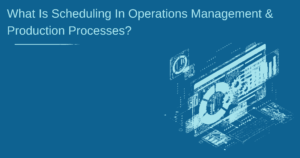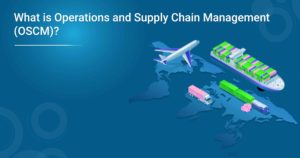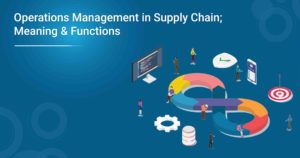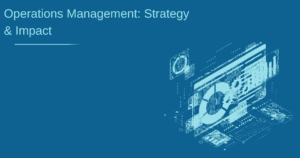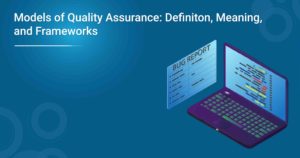Operations management in hospitals is one of the most important aspects of functioning and smooth operations. It encompasses all the different management areas within a healthcare facility, from human resources to supply chain and everything in between. By understanding the crucial functions of operations management, you can help ensure that your hospital runs as efficiently and smoothly as possible.
What is Operations Management in Hospitals?
Operations management in hospitals is the process of planning, organising, and controlling the operations of a healthcare organisation. It includes the management of both clinical and non-clinical operations. The main goal of operations management in hospitals is to ensure that all operations are carried out efficiently and effectively.
It overlooks various essential aspects of hospital operations, such as staffing, patient flow, resource allocation, and process improvement. Operations management in hospitals also helps ensure that the hospital is running smoothly and meeting its goals.
Importance of Operations Management in Hospitals
Operations management in hospitals is crucial to the success of any healthcare organisation. It helps to ensure that all operations are carried out efficiently and effectively. Additionally, hospital operations management also helps improve patient care quality and safety.
Operations management in hospitals is also critical for financial reasons. Proper operations management can help to reduce costs and improve efficiency. It, in turn, can lead to increased profits for the hospital.
Operations management in hospitals is a complex and challenging process. However, it is essential for the success of any healthcare organisation. Proper operations management can help to improve patient care quality and safety, as well as increase profits.
Without operations management, hospitals would not be able to function correctly. Operations managers ensure that hospitals run smoothly and meet their goals.
Are you interested in a career in operations management in hospitals? Well, there are many great programs available. A degree in operations management can help you start a rewarding career in this vital field. We offer Advanced Certificates in Operations, Supply Chain and Project Management for aspiring operations managers.
Also read: A Beginner’s Guide To Operations Management
Main Functions of Operations Management In Hospital
In any organisation, operations management (OM) is the process that coordinates and oversees the production of goods or services. It includes developing, implementing, and supervising systems that create and deliver a company’s products or services. In healthcare, operations management is crucial in ensuring patients receive high-quality care safely and efficiently.
There are four main functions of operations management in hospitals: quality management, resource management, process improvement, and patient safety.
Quality Management
Quality management is essential to providing safe, high-quality care. Quality management is the process of ensuring that healthcare services meet and exceed patient expectations. It includes setting quality standards, measuring and monitoring performance, and taking corrective action when necessary. Only quality can meet the challenges of an ever-changing healthcare landscape and ensure that patients receive the best possible care.
It is the responsibility of operations managers to ensure that quality standards are met. To do this, they must develop and implement quality management systems. These systems help operations managers to identify and correct problems before they result in poor patient outcomes.
Tasks Included in Quality Management:
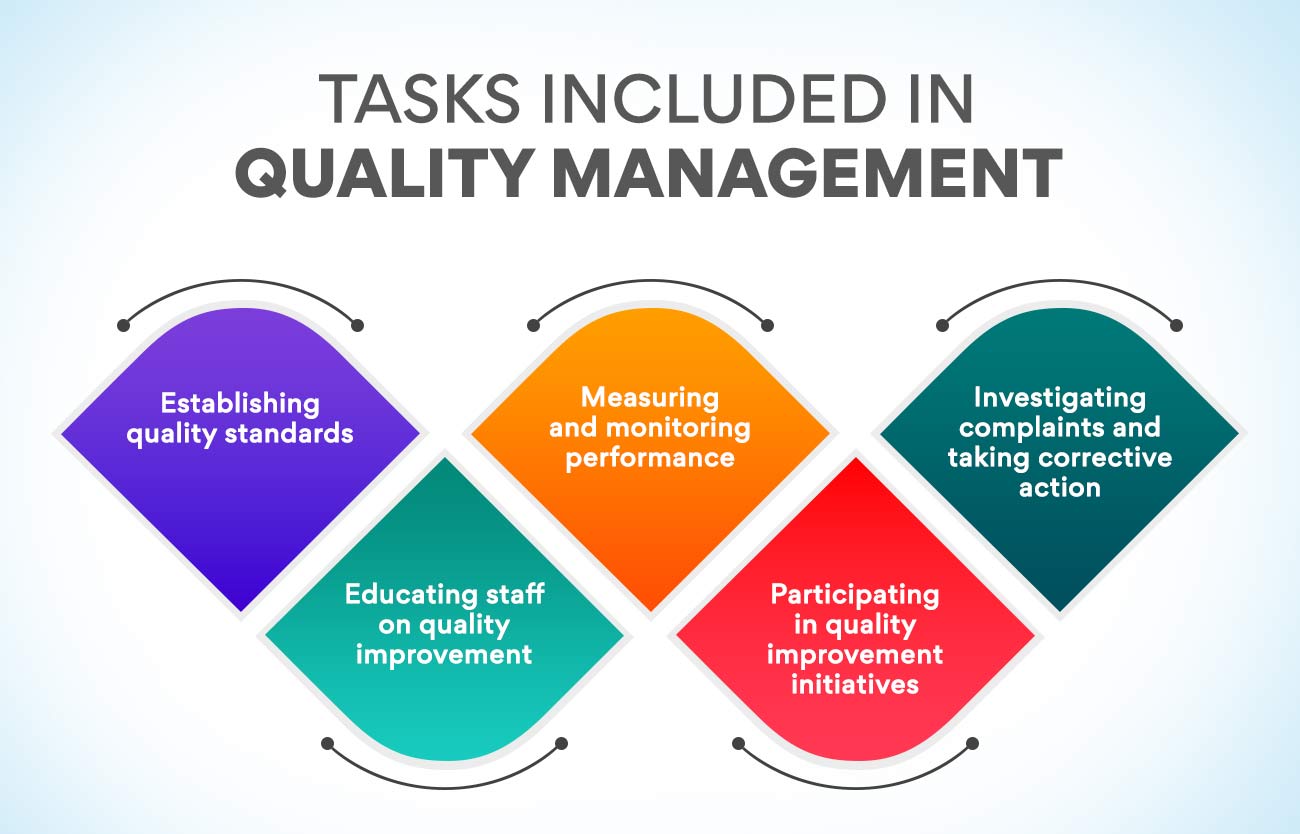
Establishing quality standards: This involves developing criteria against which the quality of healthcare services can be measured. There are many different quality standards that operations managers can choose to adopt, such as those set by the government.
Measuring and monitoring performance: This involves collecting data on the quality of healthcare services and identifying areas where improvement is needed. Operations managers can use various methods to collect data, such as surveys and patient satisfaction scores.
Investigating complaints and taking corrective action: It is all about operations managers taking complaints from patients or their families seriously and using them to improve the quality of healthcare services. Operations managers must investigate every complaint, identify the root cause, and take corrective action to prevent it from happening again.
Educating staff on quality improvement: It is essential to ensure that all staff members are committed to providing high-quality care. Operations managers must provide training on quality improvement methods and ensure that staff members use them correctly.
Participating in quality improvement initiatives: It involves operations managers working with other departments in the hospital to identify and implement quality improvement initiatives. These initiatives could include changes to how healthcare services are delivered or modifications to how the hospital is run.
Resource Management
Resource management ensures that all resources (e.g., personnel, equipment, supplies) are used efficiently and effectively. In healthcare, resource management is crucial to ensuring that patients receive the care they need promptly. Healthcare operations have different resources, and each needs to be managed effectively.
The first step in resource management is planning. Planning entails goals and objectives set for the use of resources. Once goals and objectives are set, a plan can be developed to achieve them. The second step is implementation. This step is about putting the plan into action and ensuring that all resources are used according to the plan. The final step is evaluation. This step involves assessing whether or not the goals and objectives were met. If they were not, then adjustments can be made to the plan.
Tasks Included in Resource Management:
Scheduling: This task involves creating a schedule for the use of resources. The schedule should be designed to meet the organisation’s and the patient’s needs. It is essential to consider the availability of resources when creating the schedule.
Forecasting: This task involves predicting future resource needs. It is done by analysing past trends and current conditions. Forecasting can help organisations prepare for future demands and make necessary adjustments to the resource plan.
Inventory control: Accurate inventory is essential for resource management. This task involves tracking the levels of resources and ensuring that they are adequate to meet the organisation’s needs.
Budgeting: Without an adequate budget, resource management is complex. This task involves developing a budget for the use of resources. The budget should be designed to meet the goals and objectives of the organisation.
Supply Chain Management: Supply chain management manages the flow of resources (e.g., materials, information, money) from suppliers to customers. In healthcare, supply chain management is crucial to ensuring that patients receive the care they need on time.
Staffing: One of the essential tasks in healthcare operations is staffing. This task involves ensuring that there are enough personnel to meet the demands of the organisation. It is crucial to consider the skills and experience of the staff when making staffing decisions.
Training: Another critical function of operations management in hospitals is training. This task involves providing employees with the knowledge and skills they need to perform their jobs effectively. Training is given to both new and existing employees who need to learn new skills. Ensuring that all employees receive the training, they need to perform their jobs effectively is essential.
Process Improvement
Process improvement is the systematic identification and implementation of changes that will improve the quality and efficiency of healthcare services. Operations managers often lead process improvement efforts in collaboration with other healthcare team members.
Six Sigma is named among the most important tools in the process improvement toolbox. Six Sigma is a data-driven approach to identifying and eliminating errors and waste in healthcare processes. It has successfully improved various healthcare operations, from patient registration to discharge.
Process improvement is dependent on the effective use of data. Operations managers must be skilled in data collection and analysis to identify improvement opportunities. They must be efficient in communicating their findings to the rest of the healthcare team.
Tasks Included In Process Improvement:

Data collection: Before any improvements can be made, operations managers must first collect data on the current state of the healthcare process. This data can be managed through various methods, such as observations, interviews, and surveys.
Data analysis: Once data has been collected, it must be analysed to identify areas of opportunity. This process often involves creating flowcharts and other visual aids to help illustrate the current process. For instance, a flowchart might show how many steps are involved in a patient’s journey from registration to discharge.
Identifying opportunities: After the data has been analysed, operations managers can begin to identify opportunities for improvement. These opportunities might involve eliminating steps in the process, streamlining communication between departments, or increasing the use of technology.
Implementation: Once opportunities for improvement have been identified, operations managers must work with the rest of the healthcare team to implement changes. This process can be challenging, as it often requires changing long-standing processes and procedures.
Communication: Throughout the improvement process, operations managers must keep the rest of the healthcare team informed of their progress. This communication can take many forms, from regular updates at team meetings to more formal presentations.
Implementation of changes: After the improvements have been made, operations managers will need to monitor the process to ensure that the changes have the desired effect. This monitoring can involve collecting data on the process and comparing it to the data collected before the changes were made.
Patient Safety
Operations management in healthcare is responsible for ensuring patient safety. It includes ensuring the hospital environment is safe, clean, and free of hazards. Operations managers also develop policies and procedures to prevent errors and accidents. They coordinate with staff to ensure they are properly trained in safety procedures.
With patient safety being a top priority in healthcare, operations managers play a vital role in ensuring that a hospital is a safe place for patients and staff. It sets the foundation for quality care and a positive patient experience. All the staff must be appropriately trained and follow the set safety procedures to avoid accidents. The operations manager must constantly monitor the hospital environment and make necessary changes to keep it safe.
Tasks Included In Patient Safety:
Developing policies and procedures to prevent errors and accidents includes creating policies on handling hazardous materials, what should be done during a fire, and how to evacuate the building safely.
Working with hospital staff to ensure they are adequately trained in safety procedures: This includes training on how to use safety equipment, handle hazardous materials, and what to do in an emergency.
Inspecting the hospital environment includes checking for trip hazards, ensuring adequate lighting, and ensuring the building is up to code. It also includes ensuring that the hospital has an emergency plan in place.
Investigating accidents and incidents to determine root causes and prevent future occurrences. It includes interviewing witnesses, reviewing security footage, and conducting analysis to identify trends.
Operations Management In Hospital: Bedrock Of A Successful Healthcare Industry
The operations management in hospitals is responsible for the smooth running of the hospital. Operations managers ensure that all the hospital departments are working efficiently and that the patients get excellent care.
They are also responsible for the hospital’s financial management, including budgeting and forecasting. In addition, they also have to deal with the human resources in the hospital, including recruitment, training, and development.
Healthcare operations management is a vital part of the hospital, and they play a crucial role in the success of the healthcare industry. Without it, the hospital would not be able to function correctly, and the patients would not receive the best care. Therefore, operations management is a great option to consider if you are thinking of a healthcare career.
Plenty of educational resources are widely available online if you are interested in learning more about operations management in hospitals. You can also find plenty of books on the subject. However, the best way to learn about this field is to get experience working in a hospital. It will give you an initial look at how operations management works and what its responsibilities are.
You can also start with our Advanced Certificate in Operations, Supply Chain and Project Management, which gives you a detailed insight into operations management. Set your career on the right track with this advanced certificate. Check it out now.






